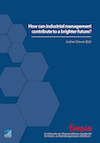Search


Bibtex
Cite as text
@Inbook{Rose+Maul+Hölzle+Bauer,
Cite-key = "Maul023WGAB",
Year= "2023",
Volume= "Schriftenreihe der Wissenschaftlichen Gesellschaft für Arbeits- und Betriebsorganisation (WGAB) e. V.",
Pages= "135-152",
Journal = "WGAB",
Title= "Navigating Ecosystem Virtuality",
Author= "Robert Rose (1), Valeska Maul (1), Katharina Hölzle (1, 2), Wilhelm Bauer (1, 2); (1) Fraunhofer Institute for Industrial Engineering IAO; (2) Institute of Human Factors and Technology Management IAT",
Doi= "https://doi.org/10.30844/wgab_2023_8",
Abstract= "Addressing future challenges by means of innovation requires organizations to work together to a much larger degree than today, requiring both physical (‘colocated’) and digital collaboration. This collaboration for innovation often goes beyond single organizations and results in networks of shared value creation comprising different actors such as companies, research institutions, or supporting actors. These ecosystems of innovation transcend geographical and organizational boundaries and are enabled by the use of virtual tools. Our article is set out to capture the spectrum between colocated and digital collaboration in innovation ecosystems by introducing the concept of ecosystem virtuality. Specifically, we look at the degree of technology dependence, informational value, and temporal dispersion, and propose key antecedents of ecosystem virtuality such as geographical dispersion, boundary conditions such as the level of trust among actors, and how these factors influence the innovative performance of the ecosystem. Our conceptual contribution offers a pathway to operationalize and measure the degree of colocated and digital collaboration beyond single organizations, and therefore, allows for future empirical work to investigate potential optima of virtuality in innovation ecosystems. In perspective, knowing and understanding the degree of virtual tool use among actors in an innovation ecosystem is imperative for its involved actors to find a balance when collaborating in the physical and digital world.",
Keywords= "virtuality, ecosystems, innovation ecosystems, digital collaboration",
}
Robert Rose (1), Valeska Maul (1), Katharina Hölzle (1, 2), Wilhelm Bauer (1, 2); (1) Fraunhofer Institute for Industrial Engineering IAO; (2) Institute of Human Factors and Technology Management IAT(2023): Navigating Ecosystem Virtuality. Schriftenreihe der Wissenschaftlichen Gesellschaft für Arbeits- und Betriebsorganisation (WGAB) e. V.(2023), S. 135-152. Online: https://doi.org/10.30844/wgab_2023_8 (Abgerufen 21.10.24)
Open Access
Abstract
Abstract
Addressing future challenges by means of innovation requires organizations to work together to a much larger degree than today, requiring both physical (‘colocated’) and digital collaboration. This collaboration for innovation often goes beyond single organizations and results in networks of shared value creation comprising different actors such as companies, research institutions, or supporting actors. These ecosystems of innovation transcend geographical and organizational boundaries and are enabled by the use of virtual tools. Our article is set out to capture the spectrum between colocated and digital collaboration in innovation ecosystems by introducing the concept of ecosystem virtuality. Specifically, we look at the degree of technology dependence, informational value, and temporal dispersion, and propose key antecedents of ecosystem virtuality such as geographical dispersion, boundary conditions such as the level of trust among actors, and how these factors influence the innovative performance of the ecosystem. Our conceptual contribution offers a pathway to operationalize and measure the degree of colocated and digital collaboration beyond single organizations, and therefore, allows for future empirical work to investigate potential optima of virtuality in innovation ecosystems. In perspective, knowing and understanding the degree of virtual tool use among actors in an innovation ecosystem is imperative for its involved actors to find a balance when collaborating in the physical and digital world.
Keywords
Schlüsselwörter
virtuality, ecosystems, innovation ecosystems, digital collaboration

 English
English